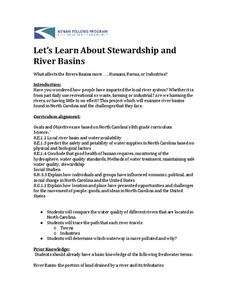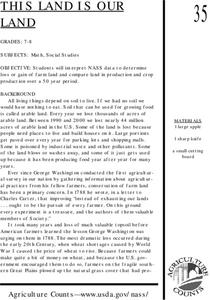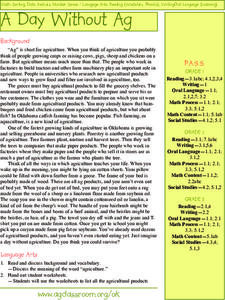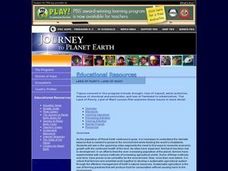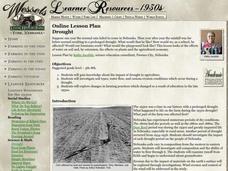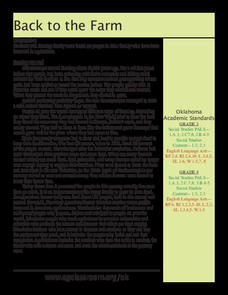Curated OER
Breeds of Cattle Internet Search
Pupils identify different breeds of cattle and select one breed to investigate further. They gather information online about breed's origin, physical characteristics, advantages, and disadvantages, and present their findings orally to...
Curated OER
Catch Up On Tomato Technology
Students explore the ways in which technological advances have benefited tomatoes as a commodity. In a small group, students review information related to the selective breeding and genetic engineering of tomatoes. Groups compose a...
Kenan Fellows
Let's Learn About Stewardship and River Basins
What does it mean to be a good steward? Middle school environmentalists learn to care for their state's waterways through research, a guest speaker, and poster activity. Groups must locate and learn more about a river basin and the human...
Curated OER
This Land is Our Land
Students interpret NASS data to determine loss or gain of farm land and compare land in production and crop production over a 50 year period.
Curated OER
Where Does Food Come From?
Distinguish between food and non-food items. Recognize that food is obtained from both plant and animal sources. Identify sources for some common animal foods then construct a simple food path from the farm to the consumer.
Curated OER
A Day Without Ag
Students investigate the concept of agriculture. They focus upon the presence of agriculture and the personal implications of it. Students generate lists related to the concept to encourage group discussions. The products of agriculture...
Curated OER
About Sheep
Students study sheep ranching practices and wool gathering. In this agriculture lesson, students discuss sheep ranching and construct a sheep book of information and pictures. Students color diagrams and fill in 3 blanks.
Curated OER
What does AG have to do with me?
Students practice alphabetizing while categorizing sources of basic agricultural products. They discuss agricultrual products, discover where they are grown and draw a simple agricultural scene on poster board.
Curated OER
A DAY WITHOUT AG
Young scholars consider and discuss the meaning of the word "agriculture" and how agriculture affects their lives every day. Students identify the various ways that agriculture touches their personal lives. Young scholars use worksheets...
Curated OER
Wheat: Ancient and Ageless
Students label the parts of a wheat plant on a worksheet. In this Egyptian farming lesson, students thresh a wheat stem and estimate the amount harvested. Students research Ancient Egypt online.
Curated OER
Finding Simple Machines in Farm Machinery
Students identify simple machines and how they must work together to form a piece of equipment used in agriculture. They create a diagram of a piece of farm equipment and write about two of the simple machines they drew.
Curated OER
Coffee Plantations
Students explore coffee and coffee plantations. They view a Power Point presentation of what coffee looks like, where it grows, and how it is harvested. They discuss the environmental impacts on growing cofee and how it compares to...
Curated OER
Space Age Technology Comes to Earth
Young scholars explore eight career and technical areas and make connections with business, family and consumers, and technology. They examine and describe how agriculture and natural resources impact our quality of life. They explore...
Curated OER
Land of Plenty, Land of Want
Students view a video about the state of the environment. They discover the topic of sustainable agriculture. They identify problems and how to solve them.
Curated OER
Drought
Students gain knowledge about the impact of drought in agriculture. They investigate soil types, water flow, and various erosion conditions which occur during a drought and see how farming practices changed after the 1930's.
Curated OER
The Fact Finders
Learners analyze agricultural data and make predictions about events in history. In this history lesson, students correlate the relationship between historic events and issues in agriculture to see if there is a correlation. They analyze...
Curated OER
THE GREAT DEPRESSION THROUGH PHOTOGRAPHS
Students, investigating and analyzing the period known as the Great Depression, view and critique photographs of the agricultural Acadian community in the St. John Valley. They assess the photographs to make conclusions about the...
Curated OER
Better Butter
Students explore the process of making butter. In this agriculture lesson, students discuss how butter is made today and how it was made in the past. Students make their own butter using baby food jars and some "elbow grease."
Curated OER
Kensington Mansion: Plantation, Sharecroppers, Tenants
Eleventh graders investigate the significance of the Kensington Mansion. In this South Carolina history lesson plan, 11th graders take field trips to the mansion and research primary and secondary sources about plantations,...
Curated OER
Next Year's Seeds
Students play a game that demonstrates variables that affect farming. They write letters requesting free seed catalogs. They discuss the saying "A penny saved is a penny earned" in relation to what they learned from playing the attached...
Curated OER
Track the Path of Coffee From Farm to Store Shelf
Students investigate the cultivation and marketing of coffee. In this global studies lesson, students consider the connections of the 21st century world as they explore how coffee makes it from farms to their homes. Students consider the...
Curated OER
My Farm Web
Third graders explore agriculture by viewing video clips in class. In this farm animal lesson plan, 3rd graders identify the animals mostly eaten that come from farms and the types of food they consume before they are eaten by us....
Curated OER
Back to the Farm
Read up on farming and ranching and connect this information to your learners' lives. After reading, send class members home to fill out a family tree and trace their family history, focusing on farming and ranching backgrounds. Once...
Curated OER
Building the Terrarium
Learners draw a layout of their proposed terrarium. In this social studies instructional activity, students discuss how Mayans farm to produce food for the family. They compare their farming method with modern farming practices.




